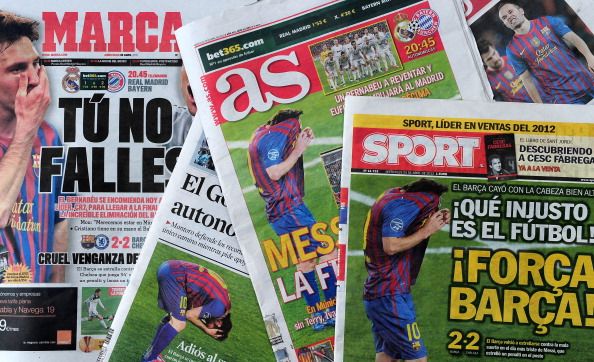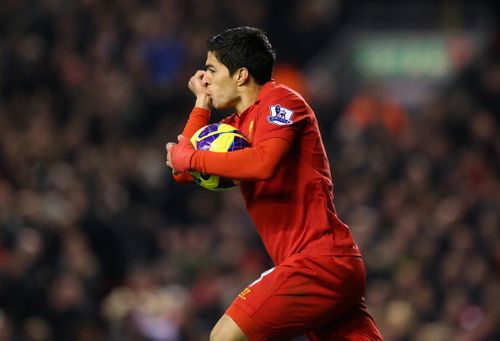
The Football Media Circus
I hate football media.
Well, most of them.
You see, an unhealthy culture has developed within the mainstream media in their reporting of football. When the product of discussion is supposed to take place on the field of play, there is an alarming trend developing whereby off-field incidents are sensationalised to the extent of mirroring the gossip and truly disgusting culture that is found in the celebrity gossip and paparazzi world. Such celebrity websites can be truly horrific in the content that they post, often creating completely fake rumours just to stir up some conversation. Such outrageous and completely low acts of desperation have no regard for the people who are the victims of blind accusations, rumours and false information. Sadly, this culture is entering football and it is demeaning the action on the pitch, which has become merely a sideshow in many cases.

One can take a very relevant and current example of the English media campaign against Luis Suarez. Before I go on, I want to make this very clear – I very much admire and sympathise with Suarez. While I do not condone such actions that he has found himself paying for, such as the incident with Patrice Evra last season, there are so many minor incidents, which do not deserve to be mentioned in any newspaper, let alone the front page. I am referring to countless accusations of diving and claims of cheating levelled against Suarez by the English media.
This is a completely biased form of opinion, one which is only seemingly made without rational consideration and aimed at providing journalists the content with which to fill their days.
I can recall a stonewall penalty that Suarez should have had against Norwich earlier this season which was not given by the referee. The media chose to ignore this incident, presumably because this injustice was not worth reporting. Against Stoke City, Suarez was involved in a few altercations with a few Stoke City players and was battling with the referee, pleading to be given legitimate fouls committed on numerous occasions by the Stoke City defenders. At the conclusion of the game and quite unsurprisingly, the media focused on the behaviour of Suarez towards the referee and his attempts at gaining free-kicks by “going down easily”. The media chose to ignore the harsh tackles and approach from the Stoke players while lambasting Suarez for his constant attempts at manipulating the referee and trying to get the Stoke players booked.
Furthermore, when Everton hosted Liverpool at home, Phil Neville was booked for a dive by the referee. Once again there was minimal, if not zero, coverage of this truly hideous crime committed by the captain of Everton. Perhaps it was because he is English. The most recent example and perhaps the most clear indication that there is a bias against Suarez is the almost universal condemnation levelled at Suarez for his handball against Mansfield Town. What strikes me most is how the media have portrayed Suarez to have not only cheated by deliberately hand-balling, but also how he bragged about it and goaded the Mansfield Town supporters by pointing to the hand which made contact with the ball. This is one of the most ridiculous things I have ever heard because any slightly reasonable football supporter would know that Suarez has a tattoo of his daughter’s name on his wrist which he kisses after every goal he scores. He also kisses his wedding ring every time he scores. Using a man’s love for his family against him to stoke the fires of a witch hunt is reprehensible.

In addition to these biased accusations, the commentator of the game uttered the words “work of a cheat” when describing the goal. Not only is this an unfair and biased statement, it is unprofessional bordering on insulting. The most ridiculous thing of all is that the media chastised Suarez for not admitting that he handled the ball. That is like accusing a player of not admitting the ball came off his shin for a corner which leads to a goal for his team.
If you visit a celebrity website or read a celebrity magazine, you will inevitably come across pictures of a close up shot of a celebrity woman’s stomach. The editor/publisher will add an arrow to indicate where we should look on the photograph and amazingly there seems to be an irregularity in the lines of the shirt she is wearing. “PREGNANT!” the caption would declare, and with that fan-sites start speculating whether it is a boy or a girl. Nine months later and the celebrity woman in question is secretly photographed on a beach wearing a swimsuit and seemingly as thin as she was nine months previous. You might as well invent such stories if there are idiots who read them and buy your magazines. This sad state of affairs can be adapted with an almost frightening similarity to football’s fastest rising source of lazy journalism – the transfer market.
It is within this world that journalism standards hit the depths of mediocrity-as if it follows a cycle like the tides follow the moon. Metaphorically, it is as if the plague sweeps the world of journalism every European summer and January and then suddenly leaves the world to rest for a few months. If you still think that journalists don’t make up rumours, I would like to point out a recent rumour started by @TAngleFootball and @th14renato in order to expose lazy journalism. The fake rumour was that Eduardo Vargas of Napoli was to join Arsenal this January transfer window. The rumour was started on Twitter and included fake quotes from the player and fake details about the transfer. The result of this experiment was astonishing. The rumour appeared on the following mainstream media outlets:
- MirrorFootball
- ESPN Brazil
- Lancenet.com
- Gazzetta Dello Sport
- Rai Sport
- Daily Mail
- Goal.com
- Express.co.uk
- Football-italia.net
These are just a sample of the media outlets that have published the Vargas to Arsenal rumours started up by two people on Twitter. In an even more embarrassing twist in the uncovering of lazy journalism, the author of the story published on the Mirror, John Cross, claimed that the first he heard of the Vargas rumour was after the story had been published under his name. One must wonder how little journalists actually know when they write transfer stories and more worryingly, how much of it is taken from Twitter. As one Twitter user asked, “Don’t you read your ‘own’ articles before they are published?” It is a legitimate question and it puts into question how much content published in newspapers and online news sites is actually the work of the authors that wrote them. It also highlights how much content is just copied and pasted from other sites, with no research or enquiry as to the source of the information or its legitimacy. Take all this in as you please, but I for one have lost faith in football media transfer news.

Apart from my ramblings about the media, it seems that on a general level, the media focuses too much on the negatives and not enough on the positives. Every time a team have lost a few games in a row, the media speculates the future of the manager. Every little training ground bust up is caught on camera and treated as the total and utter destruction of the dressing room. A player not passing to a team mate can be viewed as a sign that they don’t like each other. If a player dives, he is a diver. If a player is from Brazil, he is too lightweight to play in the Premier League. The John Terry/Anton Ferdinand saga should have been played out in private but it didn’t. Even the recent ‘scandal’ surrounding Pep Guardiola’s refusal to shake the hand of Cristiano Ronaldo crept under my skin. Just today, as I am writing this article, one journalist asked Rafael Benitez at the pre-match press conference whether David Luiz’s haircut would affect his form.
Yes, football media has become like the paparazzi and it has grown into a gossip monster, incapable of resisting the urge to seek and piece together poor quality content to gain as many readers as possible. Where being a sports journalist was previously looked upon by many teenagers as the ultimate career, it now more or less resembles a career working for a circus.
The media could well improve by focusing on the true stories in football – the ones that take place on the pitch. Maybe that way, the mainstream media could return to being more positive and actually make people happy to read about football. As George Costanza from Seinfeld says, “Why dwell on these negatives themes?”